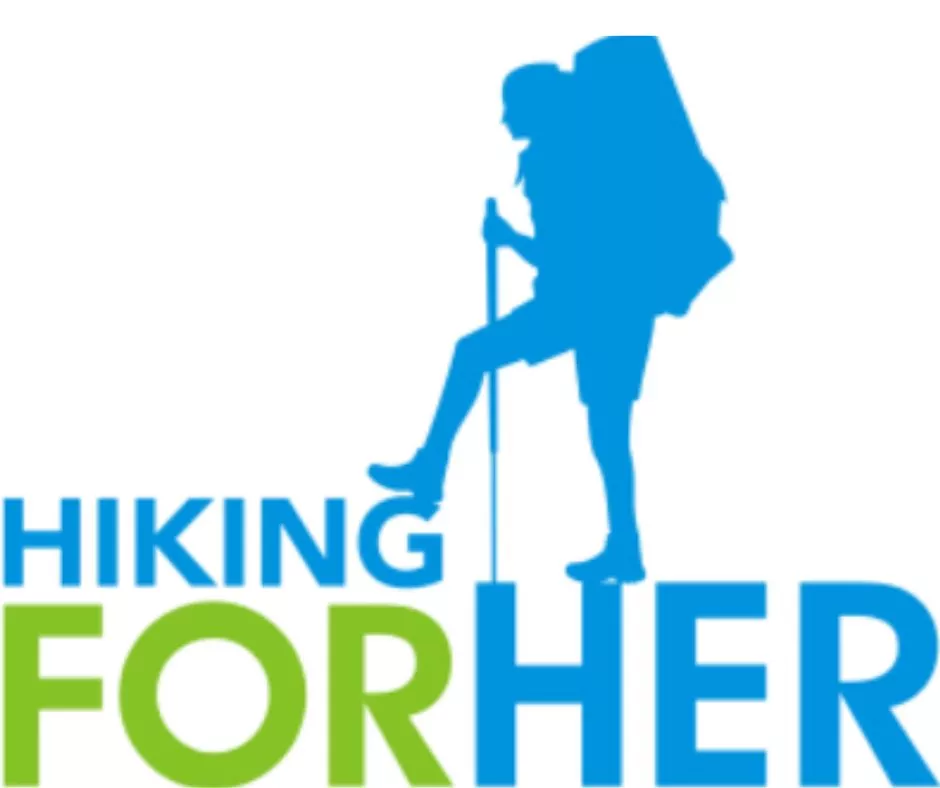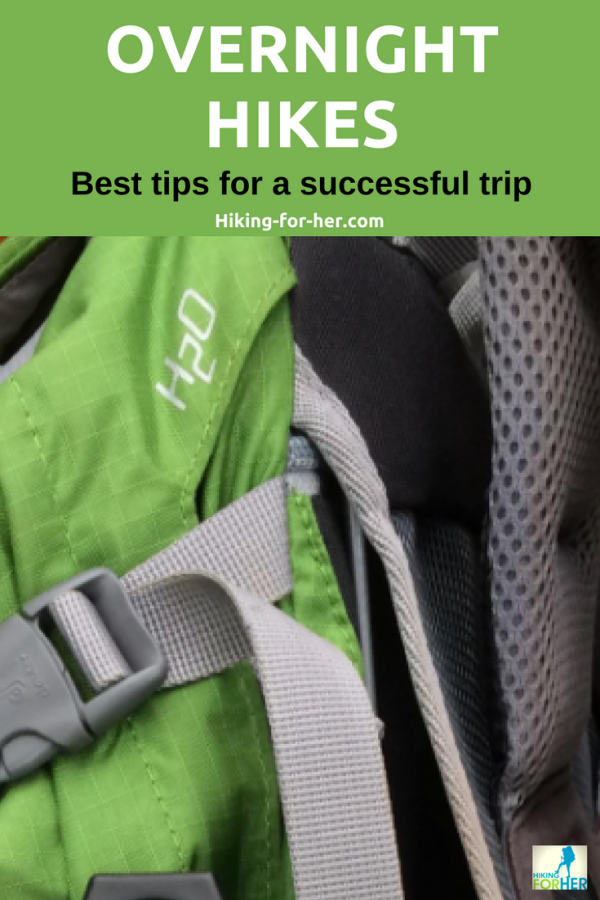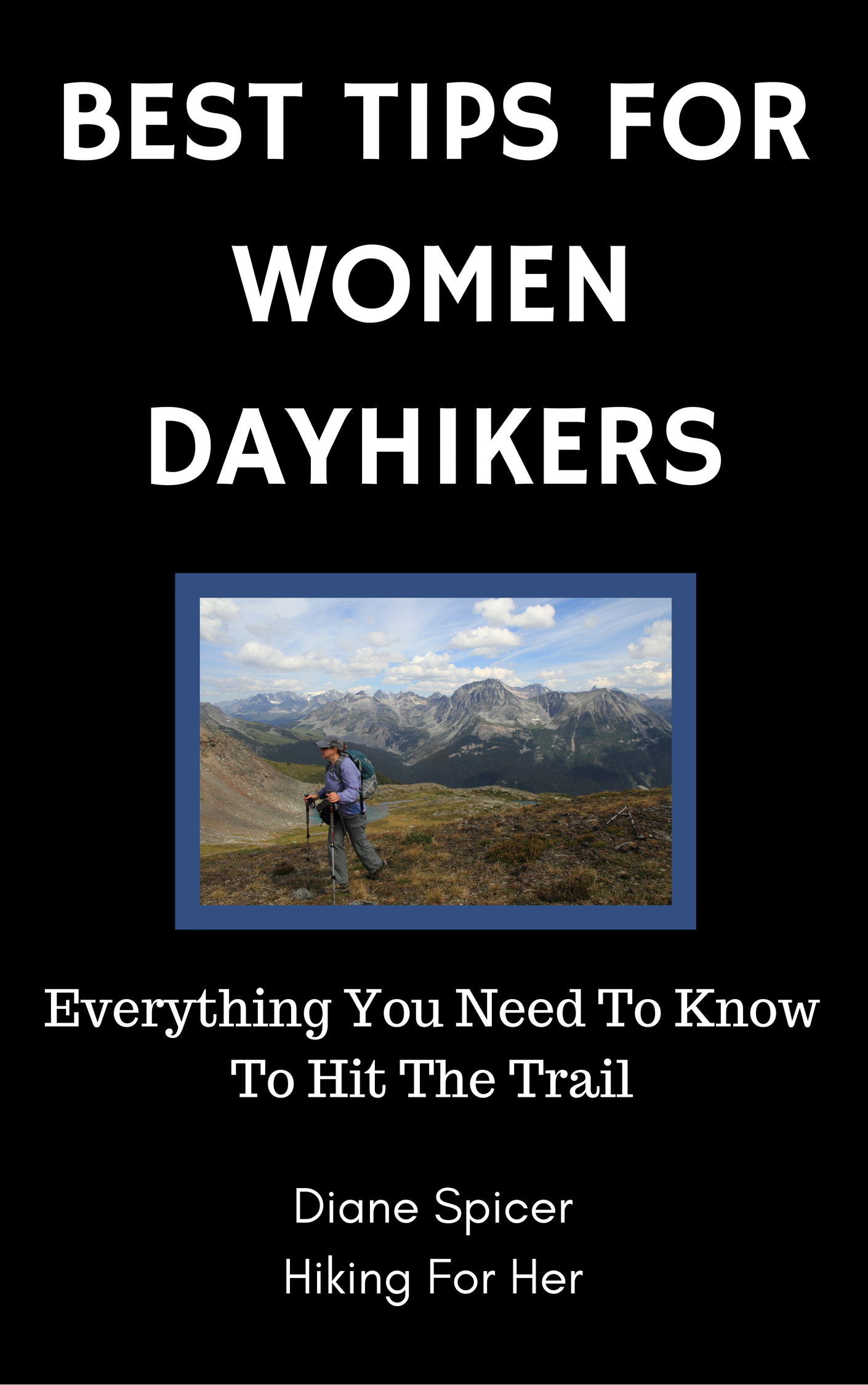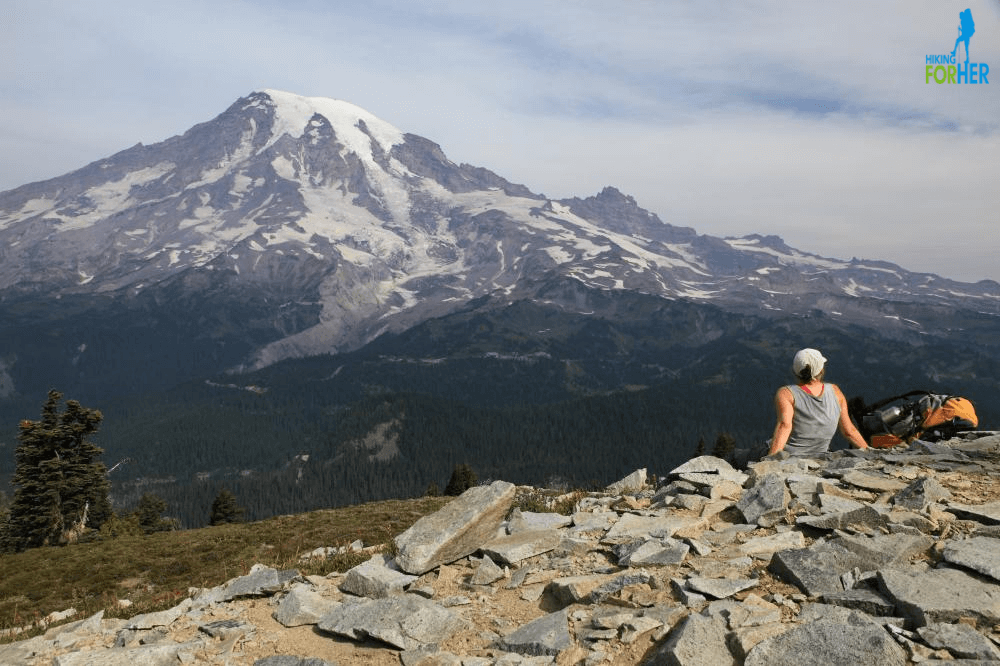Overnight Hike Planning:
Best Tips For Success
By Diane Spicer
You're here for the best tips on planning an overnight hike.
Good for you!
It's folly to throw a few things into a backpack and hope for the best.
- Thoughtful planners make great overnight hikers!
Going out on a limb here, but maybe this is your first foray into overnight hiking?
Even better!
- No bad habits to stand in the way of your success ;)
Let's mainly use REI Co-op as our source for overnight hike gear and other essentials, for two reasons:
REI treats its members right, with an annual rebate around 10% of all purchases.
- Essentially, you get paid to shop for high quality gear backed by great customer service and generous return and exchange policies.
Second good reason
Hiking For Her has been using REI gear since the mid 1970s, and appreciates the wide range of high performance gear and clothing they carry.
- It's also the reason HFH is an REI affiliate: if you purchase through the links on this website, HFH receives a small percentage but it costs you nothing extra.
Just so you know...
This article is part of a series of helpful hints in conjunction with REI on how to get over your "buts".
- You know, the reasons that stop you from expanding your skill set as a hiker.
- Or keep you from even getting started.
This page is all about "I want to learn how to backpack but I don't know how to get started".
And according to the email Hiking For Her receives, this "but" is very common, so you're in good company.
But wouldn't you rather be in great company on an overnight hike?
Let's get your plans started already!
Overnight hike essentials:
attitude adjustment
So you've got a destination in mind, and the maps to get you there.
- If not, try this selection of maps.
What's the next item on your overnight planning list?
Surprisingly, it's your attitude.
The transition from day hiker to overnight hikes can be daunting.
If you are a day hiker planning your first overnight trip, you're going to be carrying more weight than usual.
So your attitude has to enlarge, shall we say, to match your load.
- Hiking gear, but also camping equipment needs to come along on your trip.
Depending on your circumstances, you also might feel a bit burdened by the amount of planning, packing, and even the trail miles invested in an overnight hike.
- Because you have to pack up and head home the very next morning :(
I mention this not to throw a wet blanket on your overnight hiking dreams, but to prep you for the sadness that may accompany you as you hike out to the trail head.
My suggestion?
Bring luscious trail treats to take the sting out of it.
- In a bit of reverse psychology, I use Honey Stingers.
Okay, still with me?
Your tenacity is about to be rewarded with great tips for getting fully equipped for a fantastic overnight hike.
Overnight hike essentials:
the gear you need
An overnight hike combines two skill sets:
day hiking + lightweight camping.
It's a given that backpacking, even for one night, requires equipment that you may not have acquired yet - but will need for a comfortable and safe camping experience.
- If your schedule allows, you can be a weekend hiker, with both Friday and Saturday nights devoted to your hiking trip.
So let's look at some worthy options for shelter and a good night's sleep on your first overnight.
Whether or not it's just one night is up to you!
Overnight shelter
Be careful about this decision.
If you talk yourself into going fast and light, packing only a tarp, your first overnight experience might be a bit more than you bargained for.
While a tarp is lightweight, folds down small and can be easy to set up, if you're a beginner overnight hiker it can make you feel vulnerable.
You're at the mercy of moisture, contours, availability of anchor points, and (I hate to bring this up) ground dwelling creatures of various sizes and dispositions.
Hiking For Her's recommendation:
- Learn the ins and outs of an overnight hike from the comfort and security of a tent first.
But a tent is a long term commitment, not unlike a relationship.
A wise choice will stay with you for years and years.
- I still use my vintage REI Clipper tent for solo forays, although it's decades old.
- Careful maintenance helps, of course.
Here's the thing:
Avoid the temptation to overbuy on tent features you don't need yet, like extreme weather stability (four seasons and wind) or ultralight weight.
Look at tents with these features:
- three season
- vestibule to stow gear
- easy set up and tear down procedures
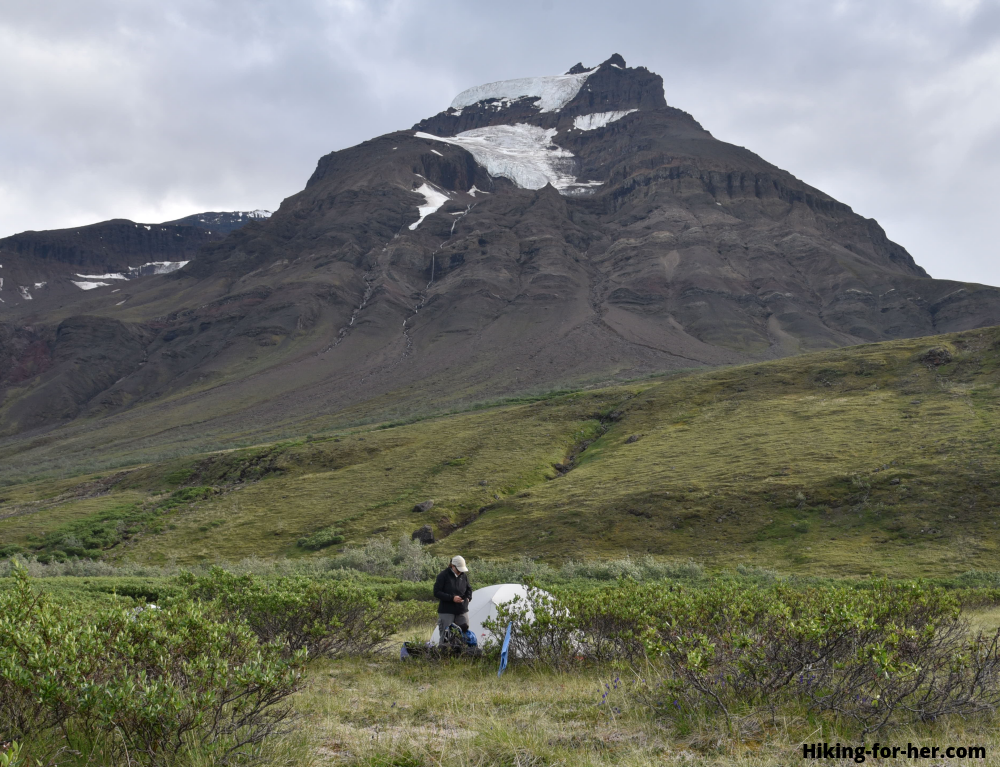 Your psychological refuge on an overnight hiking trip, and your literal refuge in the storm
Your psychological refuge on an overnight hiking trip, and your literal refuge in the storm
Tents to try
If you're going solo, take a look at this one person, compact tent: MSR Hubba.
If you have a trail buddy, the MSR Hubba Hubba (see what they did there?) is lightweight and durable enough to stand up to extended wear and tear, yet spacious.
- It's what I take with me into the backcountry.
Trail tip:
If you can find someone to teach you the ropes of overnight hiking trips, let them bring a tent for you to share.
- Ask a lot of questions: its age, price, ease of repair and maintenance.
- Notice how easy it was/was not to set up and tear down.
- Observe how the tent does/does not accommodate both of you.
- Do some on line research when you get home.
Or email me, and we can kick around the merits of the tent you're considering.
As I said, tents are an important piece of gear and you should spend the time to choose wisely.
Sleeping bag
Your sleeping bag becomes your cocoon for the night, or your haven during nasty weather or a medical emergency.
It needs to be as lightweight as possible, yet provide enough room for you to move around and not feel trapped (especially during deep sleep cycles).
Women's sleeping bags are tapered (mummy style), to eliminate weight yet give us room for our hips.
You want a bag that can stand up to cool temperatures, around the 15F range.
- If you're heading into alpine terrain, you'll need a bag rated for 0F. Nights get nippy up there!
Here's the sleeping bag I bring along on every hiking trip, regardless of length: REI Joule.
- You can read why here.
You could also consider a backpacking quilt for a smooth transition from sleeping in your bed to your tent.
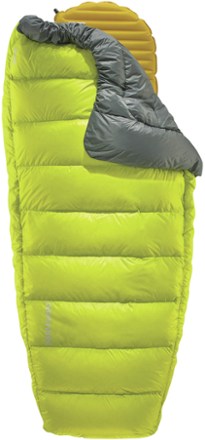 Therm-a-Rest Corus HD Quilt
Therm-a-Rest Corus HD Quilt
Benefits of a quilt:
- More tossing & turning room
- Packs down small
- Multi purpose usage
Trail tip:
Bring a set of clean clothes and socks for sleeping. You can wear them on the hike out the next day to avoid feeling (completely) grubby.
Sleeping pad
Beneath your sleeping bag or backpacking quilt, you'll need a pad.
Don't be brave and think you're tough enough to get by without one.
Three reasons:
- You lose a lot of heat to the ground, and even in warm weather this will be uncomfortable.
- If the weather turns wet, you have an additional layer of padding and protection beneath you.
- Comfort, my dear! You want a restful night of sleep, not writhing around looking for the one spot that has no rocks or roots.
Here are the pads I use:
- Self inflating women's tapered Thermarest
- Therm-a-Rest Z Lite Sol Sleeping Pad: closed cell, lightweight, super inexpensive pad
A backpack
to carry your load
A woman can never have too many backpacks, that's the truth!
If you're dabbling in the overnight hiking realm, you'll need a backpack bigger than the one you carry on day hikes.
But no need to go crazy and get a huge backpack.
At least, not yet.
You'll determine whether or not you're a backpacker after you have a few overnight hiking trips under your belt!
The volume of an overnight backpack hovers (in liters) between 40 and 70.
Here's a good choice:
 Osprey Aura AG 50 Pack - Women's
Osprey Aura AG 50 Pack - Women's
Overnight hike essentials:
your food
As with your gear, an overnighter requires two skills sets for your food:
how to select the best lightweight meals + a camp kitchen.
There are at least 3 philosophies about overnight hike menus.
A quick explanation of each...
No cook overnight hike food
Bring prepared dry foods that don't require a stove.
Just be sure to bring enough to match your appetite. It's unpleasant to hike out on an empty stomach the next day.
Pros:
- Lighten your load (and maybe your hiking gear budget) by foregoing the stove + fuel.
- Reduce your carbon footprint, too.
- Minimal time investment for refueling your body.
Cons:
- No morning coffee? No bedtime cup of tea? Be sure you can be this brutal to your body.
Examples
Example of no cook backpacking foods for this approach:
- Clean sources of protein like Tanka jerky or Epic energy bars (protein)
- Calorie dense trail bars (carbohydrates & fats): Tram bars, pemmican, and GoMacro.
- Prepackaged nut butters, like Justin's
- Crackers, bagels, and hunks of hard cheese (whole milk Swiss cheese being highest in calories)
- Customized trail mix with your favorite dried fruits and nuts
- Dehydrated hummus or bean dips on bagels
- GreenBelly complete meals in a bar
- Must I say it? Yes, I must: granola
Important trail tip
Trail tip for overnight backpacking trips:
You're hiking with a thin margin of safety, calorie wise.
Keep your precious food out of the clutches of marauding hungry critters with a Ratsack food storage bag (catchy name, don't you think?).
Their nasty little teeth won't make a dent!
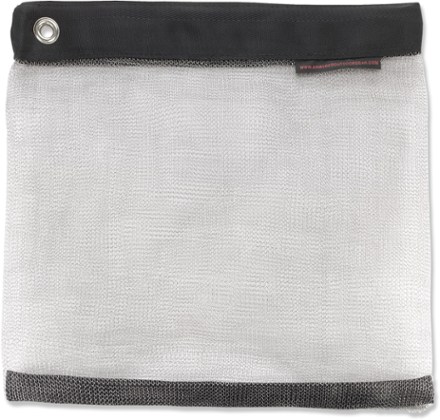 Armored Outdoor Gear Ratsack Cache Food Storage Bag
Armored Outdoor Gear Ratsack Cache Food Storage Bag
Reheat overnight hike food
Your second option:
Bring food you've prepared and frozen prior to the hike, in well packaged, double bagged portions.
Allow it to thaw in your backpack as you hike into your campsite.
Pros:
- Eat a hot meal with a minimum of prep time.
- You control the quality and source of ingredients, so if you're sensitive to particular foods this is the way to go.
Cons:
- In hot weather, you might be risking microbial growth (and its associated toxins).
- It takes time and commitment to prepare the food, adding to your overnight hike planning time.
- You need to be savvy about portions, so you don't have left overs to tempt the wild neighbors and create a smelly mess to carry out the next day.
Stove tip:
A minimalist way to boil modest amounts of water is a Jetboil. You can press this into service on cold day hikes as well.
A more versatile stove would be this MSR Whisperlite. But you'll need a cook pot as well.
- Read about titanium cook sets here.
Food suggestions for this approach:
- Meat loaf is made for this approach! Plus a few baked potatoes.
- A thick stew thaws slowly as you hike, and can be warmed up while you set up camp.
- Overnight oats (soaking while you sleep to plump up the healthy fiber and soften the texture) can be warmed up in the morning along with your coffee or tea.
Pre-packaged freeze dried food
Ah, easy street!
Select your dinner and next day breakfast entrées from a trusted backpacking food source, bring along your stove and a modest amount of fuel, boil water, stir, wait a few minutes, and enjoy.
Pros:
- Convenience at your campsite, freeing you up for more down time lounging by the lake or fly fishing or exploring.
- Lightweight and no need for a cook pot because the packaging acts as the container for rehydrating the meal.
- All ingredients are listed on the package, so you can choose your favorite flavors and avoid anything that sets off your gut.
Cons:
- This may be the most expensive route to a great overnight hike dinner, unless you hit a great sale (always check REI's deals).
- The packaging isn't recyclable, and must be carried out and discarded properly (similar to your own plastic and foil in the second option above).
- You need adequate water and fuel, plus a long handled spoon like this one, for meal prep.
- And bowls, all purpose eating utensils like sporks, and cups for everyone.
Suggestions for overnight hike dinners:
- At your campsite, boil enough water to rehydrate your pre-dinner soup or beverage, your dinner entrée, and dessert.
- You'll also need warm water for clean up duties.
- One idea for your evening meal: Backpacker's Pantry selections, with many different flavor profiles.
Suggestions for breakfast the next morning:
- Soak oats overnight in your cook pot. Then top with flax, cacao nibs, walnuts, dried berries, or whatever sounds good - no cooking, but tastes great with a mug of hot tea (best backpacking tea choices here).
- MountainHouse breakfast skillet
Trail tip:
If you're hiking a lot of miles to get to your campsite, or a few miles over rough terrain, be prepared for your huge appetite.
Sharing one dinner entree won't be a viable option if you want to stay friends with your tent mate.
- You save 10% at REI when you buy 8 or more full priced backpacking food items.
- And their shelf life will easily extend to your next overnight hiking trip.
So don't hold back with the amount of freeze dried food you're bringing.
You've already taken a look at a few ways to heat up your food.
Here is another option for food prep and clean up:
- MSR PocketRocket stove And cookset
- Kitchen kit with utensils and other necessities
Overnight hike essentials:
safe water
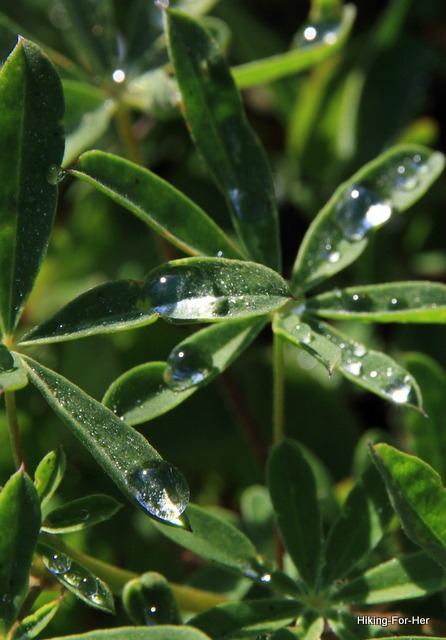 Water, water everywhere ... but can you drink it?
Water, water everywhere ... but can you drink it?On day hikes, you can get by with water from the safe sources at home or at the trail head.
But you don't want to be lugging water down the trail for an overnight, especially if you're headed toward abundant surface water.
Unfortunately, surface water in the lower 48 states and elsewhere in the world is too contaminated with microbial life to drink without treating it first.
- Read about the hazards of ingesting it here.
There are three ways you can go to ensure that your water is not going to make you sick.
Boil your troubles away
If you're already bringing a stove and fuel, budget in enough fuel and time to boil the water you need for dinner, breakfast, and hiking out again.
Trail tip:
Boiled water will taste flat.
You might be tempted to cut down your sip rate. Big mistake!
Shake it up (use your water bottle) to introduce air bubbles (oxygenating it), and the taste will improve somewhat.
Filters to the rescue
An entire universe of water filters exists, and this is not the place to go into each and every one.
- Instead, throw yourself upon the mercy of REI's gear experts by reading this article.
Hiking For Her water purification recommendations:
- The filter I carry is the MSR MiniWorks EX
- Although mine has
a fewmany years on it, it's still reliable.
I also carry a Lifestraw like this one, when I want to go fast and light.
- It won't filter enough water for meals, just my personal drinking water for the trail.
- But for ~$20, it's a great little survival tool to have in my backpack.
Water purification tablets
For an overnight, chemical water treatment is not a great way to go IMHO.
- These tablets take time to purify the water, and leave a noticeable taste residue behind.
- However, they are cheap, lightweight, and work consistently to deliver clean water in your bottle or cooking pan.
Trail tip:
Carry a few tablets as a backup plan should technology fail you.
Your overnight hike plan,
all summed up
Let's double check your plan.
You've got the gear you need to hike and camp:
- high capacity (but not too high) backpack with room for camping equipment
- enough trail food for lunch, dinner, and breakfast the next morning, plus trail snacks
- a camp kitchen, or not, depending on your preference
- shelter: a tent over your head, a pad under your butt, and a sleeping bag to snuggle into
- safe drinking and cooking water
And you've got the right attitude, which is every bit as important as gear.
- You're fully prepared for not having a perfect trip your first time out, and learning from the "oops" events that happen to all hikers.
Trail tip:
Cherish your memories of the things that went wrong.
They make great stories to share later.
- Sometimes much later, depending on how big the "oops" was ;)
Celebrate
yourself!
An overnight hike is a benchmark in your hiking career.
As hikers, let's call it a major milestone.
Use all of these overnight hike planning tips to maximize your chances of a great trip, and be sure to celebrate your achievement.
Fair warning:
Soon, an overnight hike won't be enough.
You'll be heading into backpacking territory before you know it.
- When you're ready, beginner backpacking tips here
Or ease into things, with these car camping for hikers tips!
Overnight Hike Planning Tips
|
I get emails all the time about what I wear, eat, carry and love to use on the trail. That's
why I provide affiliate links to you: the best gear that I use myself and have seen used by other hikers is instantly
available for your consideration, and the gear company sends a few
pennies per dollar to this reader-supported hiking website. There is no added cost to you! Everyone ends up a winner: Great gear for you, strong gear companies, and more free hiking tips for everyone. Thanks very much for your support. It's warmly and sincerely appreciated. It also helps send these hiking tips to all your virtual trail buddies around the globe. |
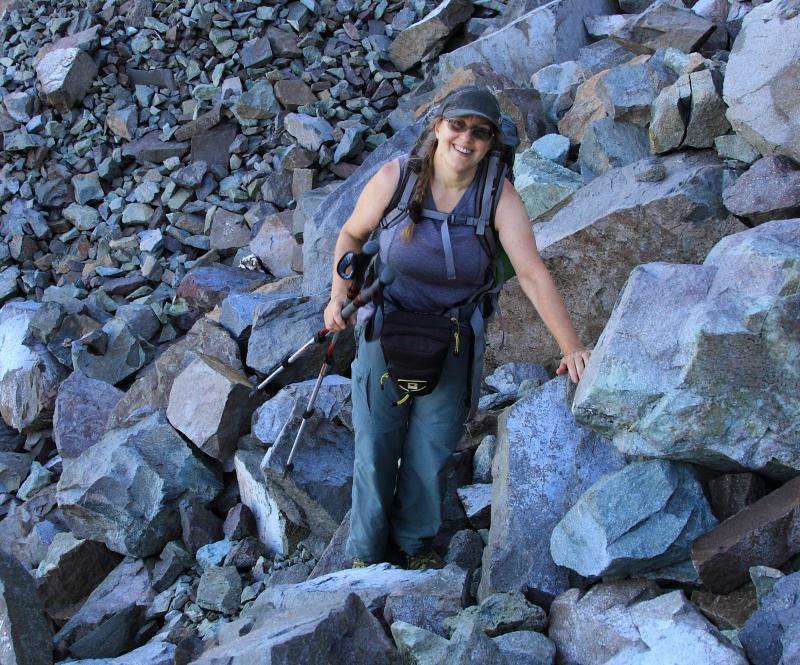 |
